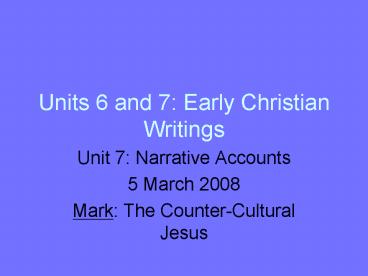Units 6 and 7: Early Christian Writings - PowerPoint PPT Presentation
1 / 16
Title:
Units 6 and 7: Early Christian Writings
Description:
Mine, he said gently, as the designer, was to suggest to the reader what he ... Apocalypticism. 5. Literary Criticism: 5.2. Conclusion and Inclusio. 9:6 ... – PowerPoint PPT presentation
Number of Views:32
Avg rating:3.0/5.0
Title: Units 6 and 7: Early Christian Writings
1
Units 6 and 7 Early Christian Writings
- Unit 7 Narrative Accounts
- 5 March 2008
- Mark The Counter-Cultural Jesus
2
Purpose of the Lecture
- To supplement
- To symbolize
- To stir up
3
On Book Cover Design
- Mine, he said gently, as the designer, was to
suggest to the reader what he might find beneath
the wrappers to offer him some simple,
uncomplicated symbol which he could recognize
enough to tempt him to read the book. Not
something which would convince him that he had
read it already, or worse, that he knew what it
was all about and
4
On Book Cover Design
- didnt want to read it anyway.
- Dirk Bogarde, A Postilion Struck by Lightning,
Chatto Windus 1977 Triad/Granada 1978, 224.
5
Thesis
- The application of an array of critical skills
supports the hypotheses that Mark - Is prior
- has a classical construction
- represents a particular type of early
Christianity - presents Jesus as liminal
- Is surrealistic
6
Critical Skills
- Source Criticism
- Genre Criticism
- Redaction (editorial) Criticism
- Historical Criticism
- Literary and Rhetorical Criticism
- Ideological Criticism
- Myth and Ritual Criticism
7
Outline
- http//www.utoronto.ca/religion/synopsis
- Genre Criticism Drama Recognition Scene
- Source Criticism Priority Literary Seams
- Ideological Criticism Pauline
- Literary Criticism Conclusion and Inclusio
- Myths of Power
- Trial of Jesus, Mishnah, Historiography
- Anthropological Criticism Food
8
4. Ideological Criticism Pauline
- Torah-observance
- Leadership
- Euangelion
- Apocalypticism
9
5. Literary Criticism 5.2 Conclusion and
Inclusio
- 96
- He did not know what to say because they were
terrified (RSV exceedingly afraid KJV sore
afraid) ekphoboi gar eyenonto.
- 168
- So they went out and fled from the tomb, for
terror and amazement had seized them and they
said nothing to anyone, for they were afraid
ephobounto gar.
10
5.3 Special Mark 5.3.1 Mark 321
- MR Solution by Translation
- NRSV for people were saying, He has gone out
of his mind. - MR note to 321
11
5.3.1. Mark 321
- Solution by changing the Greek text (5th century
manuscripts) - The original reading (his friends or his
relatives) apparently proved to be so
embarrassing that D W al altered it to read,
When the scribes and the others had heard about
him, they went out to seize him, for they said,
He is beside himself. (Bruce Metzer, A Textual
Commentary on the Greek New Testament, 2nd ed.
United Bible Societies, 1971, Deutsche
Bibelgesellschaft,1994.
12
6. Myths of Power
- 6.4 Elisha
- 6.5 The spitting Jesus
- 6.6 Outbursts
- 6.7 Wali friend and baraka power
- 6.7 Herodotus
13
6. Myths of Power
- Wali friend and baraka power Such potent
walîs may indeed be recognized for their sanctity
during their lifetimes, but most often it is
after their deaths that a cult grows around their
memory and their mortal remains, represented in
burial shrines. (Frederick M. Denny, Islam and
the Muslim Community in Religious Traditions of
the World, ed. H. Byron Earhart,
HarperSanFrancisco, 1993, 673.
14
6. Myths of Power
- after a long series of reverses in the war they
Spartans sent to Delphi and asked of which god
they should beg favour in order to ensure their
conquest of Tegea, and the Priestess promised
them victory if they brought home the bones of
Orestes. Herodotus, The Histories, Trans.
Aubrey de Sélincourt, Rev. A.R.Burn, Penguin,
1954, 1972, 1.66-69, 66.
15
7. Trial of Jesus, Mishnah, Ancient
Historiography (Luke-Acts)
- 41 J. (7) In property cases they try the case by
day and complete it by night. In capital cases,
they try the case by day and complete it by
day. - K. (8) In property cases they come to a
final decision on the same day as the trial
itself, whether it is for acquittal or
conviction. In capital cases they come to a final
decision for acquittal on the same day, but on
the following day for conviction.
16
7. Trial of Jesus, Mishnah, Ancient Historiography
- L. (Therefore they do not judge capital cases
either on the eve of the Sabbath or on the eve of
a festival.) - 55 A. If they found him innocent, they sent him
away. If not, they postpone judging him till the
next day. - The Mishnah a New Translation. Trans. Jacob
Neusner. Yale University Press, 1988.

